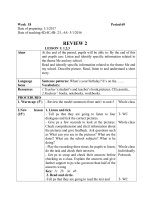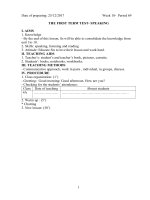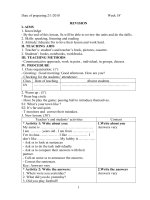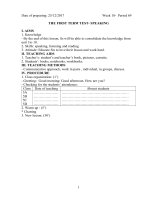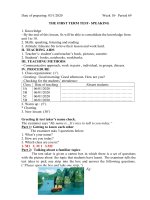- Trang chủ >>
- THPT Quốc Gia >>
- Sinh học
English 8 week 18
Bạn đang xem bản rút gọn của tài liệu. Xem và tải ngay bản đầy đủ của tài liệu tại đây (208.91 KB, 8 trang )
Week: 16
Period: 46
Date of preparing: 02/11/2017
Date of teaching: 04/12/2017
UNIT 7: MY NEIGHBORHOOD
LESSON 5: LANGUAGE FOCUS
I. OBJECTIVES: By the end of this lesson, Ss will be able to be able to review Present
Perfect Tense, some adjectives to make comparisons with, (not) as…….as, (not) the same
as, different from.
II. PREPARATIONS: Textbook, poster
III. PROCEDURES:
*Checking attendance (1’): 8A1……………………………………………………….…….
8A2……………………………………………………..……….
TEACHER’S ACTIVITIES
STUDENTS’ ACTIVITIES
1/ Warm-up: (6’)
Matching
- Have Ss match each verb to its past participle.
- Match.
* answers:
Be – been
eat – eaten
Go – gone
write – written
See – seen
live lived
Do – done
collect – collected
Attend – attended
work worked
2/ Exercises: (28’)
Exercise 1, 2, 3, 4: (p. 69, 70)
Present Perfect Tense
- Listen and write.
- Introduce the grammar:
+ Form:
S + HAVE / HAS + PP
+ We often use “FOR” and “SINCE” with Present
perfect tense.
FOR + length of time
SINCE + starting point of time.
- Work in pairs.
- Ask students to look back at the dialogue between
Nam and Na to complete the following piece of
dialogue.
(1) have , (2) lived , (3) have , (4) lived , (5) for
- Do exercise.
- Have students do the exercise 2/ page 69.
- Work in pairs.
- Get students to decide which the length of time is
and which the starting point of time is
+ For five minutes.
+ For three hours
+ Since January.
+ For ten weeks
+ Since 1990.
+ Since Friday.
+ Since the summer. + For 20 years.
- Ask students to do the exercise 3/ page 69.
- Get students to give feedback.
- Do exercise.
- Give feedback.
a. have lived
d. have attended
b. have not eaten
e. has worked
c. have not seen
f. has collected
- Have students to do the exercise 4/ page 70.
- Have students give feedback.
1. have been
5. want
2. hope
6. looks
3. have … lived
7. have … been
4. is
8. have seen
Exercise 5: (p. 70, 71)
Comparison
- Write the comparison expressions on the board.
Be the same as + N…
Be (not) as + adj + as …
Be different from + N …
Ex: The red book is the same as the yellow one.
- Ask students to do the exercise 5.
- Ask students to give feedback
a. not as large as
f. the same as
b. different from
g. as long as
c. different from
h. not as modern as
d. the same as
i. not as cheap
e. not as large as
3/ Consolidation: (7’)
- Ask Ss to choose the correct option.
1. I have lived in this area .............over ten years.
A. for
B. since
C. until
D. during
2. A coke is different ............. a Pepsi.
A. from
B. for
C. to
D. than
3. A dictionary is usually more expensive .............. a
comic book.
A. than
B. as
C. so
D. more
4. A dog is not the same ............ a cat.
A. as
B. like
C. so
D. than
5. They .......... a holiday for 10 years.
A. haven’t had
B. didn’t had
C. don’t have
D. aren’t having
4/ Homework: (3’)
- Redo these exercises.
- Prepare next lesson: Review
- Do exercise.
- Give feedback.
- Listen.
- Do exercise.
- Give feedback.
- Choose the correct option.
- Write assignments.
IV. COMMENTS:
………………………………………………………………………………………….............
…………………………………………………………………………………………………
…………………………………………………………………………………………………
…………………………………………………………………………………………………
Week : 16
Period: 47
Date of preparation: 06/12/2017
Date of teaching:
08/12/2017
UNIT 8: COUNTRY LIFE AND CITY LIFE
LESSON 1: GETTING STARTED - LISTEN AND READ
I. OBJECTIVES: By the end of the lesson, students will be able to identify the differences
between the city life and the country life.
II. PREPARATIONS: Textbook, pictures
III. PROCEDURES:
*Checking attendance (1’): 8A1……………………………………………………….…….
8A2……………………………………………………..……….
TEACHER’S ACTIVITIES
1/ Warm-up: (8’)
Brainstorming
- Have Ss talk about city life and country life.
STUDENTS’ ACTIVITIES
- Play game in two groups.
I. Getting started:
City life
Country life
Noisy
Fresh air
Tall buildings
Beautiful views
kinds of goods
Fresh foods
Entertainments
Friendly
Traffic jam
- Lead to the lesson.
2/ Presentation: (15’)
- Have Ss look at picture, and set the science.
- Explain vocabulary:
II. Listen and Read:
1. Vocabulary:
Permanently (adv): mãi mãi
Remote area (n): vùng xa
Medical facilities (n): cơ sở vật chất y tế
Accessible (adj): sử dụng
Relative (n): họ hàng
Peaceful (adj): thanh bình
- Check Vocabulary: Slap the board
- Have Ss predict True/ False sentences about Na.
1. She has been to Kim Lien village for the
weekend.
- Listen.
- Observe and listen.
- Guess the meaning, read and take
note.
- Do as directed.
- Predict.
2. She doesn’t want to live there permanently.
3. She thinks there is a lot of to do there.
4. She prefers city life to country life.
3/ Practice: (12’)
Activity 1:
- Ask Ss to listen and read, then check their
prediction.
1. T
2. T
3. F
4. F
Activity 2:
- Get students to answer the questions.
a. Na has been to the countryside (Kim Lien
Village).
b. She was there for the weekend.
c. The countryside is peaceful and quiet and there
is nothing to do.
d. She means there are no entertainments (no
libraries, no movies, no supermarkets, no zoos,...)
e. Country life is becoming better. Many remote
areas are getting electricity. People can now have
things like refrigerators and TV, medical facilities
are more accessible.
4/ Production: (7’)
- Ask Ss to answer the question:
Do you prefer the city life or the country life?
Why?
5/ Homework: (2’)
- Learn by heart vocabulary.
- Prepare “Speak + Listen”.
- Listen and read, then check.
- Work in groups.
- Answer the question.
- Write assignments.
IV. COMMENTS:
.................................................................................................................................................
.................................................................................................................................................
.................................................................................................................................................
Week: 17
Period: 49
Date of preparation: 07/12/2017
Date of teaching:
09/12/2017
UNIT 8: COUNTRY LIFE AND CITY LIFE
LESSON 3: READ
I. OBJECTIVES: By the end of the lesson, students will be able to understand the text
about of the problem of people from the countryside moving to the city.
II. PREPARATIONS: Textbook, sub-board.
III. PROCEDURES:
TEACHER’S ACTIVITIES
1/ Warm-up: (6’)
Chatting
- Ask Ss to answer some questions.
1. Do you prefer the country life or the city life?
2. Do you like moving to the city? Why?
- Lead to the lesson.
2/ Pre-reading: (14’)
- Teach vocabulary.
I. Vocabulary:
rural (adj): thuộc về nông thôn urban (adj)
strain: quá tải
Plenty (adj): nhiều
tragedy: bi kịch
(to) struggle: đấu tranh
migrant: dân di cư
(to) increase: tăng lên
- Check vocabulary: R.O.R
3/ While-reading: (15’)
Activity 1:
- Ask Ss to read the passage and find the word
has the same meaning with the phrases.
II. Read
1. Find the word in the passage:
a. of the countryside
rural
b. as many as needed
plentiful
c. become greater or larger
increase
d. a great pressure
strain
e. a terrible event
tragedy
f. of the city or city life
urban
Activity 2:
- Ask Ss to read the text again and answer the
questions.
2. Answer the questions:
a. Are many people leaving their home to the
city?
b. Does the city offer more opportunity?
c. What do many people coming to the city
STUDENTS’ ACTIVITIES
- Answer the questions.
- Listen.
- Listen, guess the meaning and read.
- Do as directed.
- Work in pairs.
- Work in groups to answer the
questions.
a. Yes, they are.
b. Yes, it is.
c. They create problems.
create?
d. What may the city not be enough?
4/ Post-reading: (8’)
- Ask Ss to read the passage again, and complete the
summary.
d. schools and hospitals.
- Work with the partner.
1. leaving
6. problems
2. home
7. schools
3. city
8. hospitals
4. rural
9. problem
5. city
10. world
- Call some Ss to present their result.
- Present the answer.
5/ Homework: (2’)
- Learn vocabulary by heart.
- Read the passage and do the tasks again.
- Write assignments.
IV. COMMENTS:
.................................................................................................................................................
.................................................................................................................................................
.................................................................................................................................................
Week: 16
Period: 48
Date of preparation: 07/12/2017
Date of teaching:
09/12/2017
UNIT 8: COUNTRY LIFE AND CITY LIFE
LESSON 2: SPEAK - LISTEN
I. OBJECTIVES: By the end of the lesson, students will be able to:
+ Talk about the differences between country life and city wife, describe changes with get
and become.
+ Listen to complete the dialogue.
II. PREPARATIONS: Textbook, pictures, cassette
III. PROCEDURES:
*Checking attendance (1’): 8A1……………………………………………………….…….
8A2……………………………………………………..……….
TEACHER’S ACTIVITIES
1/ Warm-up: (5’)
- Show two pictures.
- Lead to the lesson.
2/ Pre-speaking: (15’)
- Retell comparative.
I. Form of comparative
short adj/ adv – ER
more + long adj/ adv
S + be + becoming/ getting ...........
Ex: The town is getting/ becoming busier.
3/ While-speaking: (14’)
- Ask students to look at the two pictures to talk about
the changes of the town.
1. The town is getting busier.
2. There are more tall buildings and houses.
3. The town is getting more modern.
4. The town is becoming more beautiful.
5. The town is getting more noisier.
6. The town is becoming more dirtier.
- Have Ss talk about the changes in their hometown or
neighborhood.
4/ Post-speaking: (8’)
- Have Ss answer pre-listening questions.
a. Who is phoning Lan?
b. Where is she phoning from?
STUDENTS’ ACTIVITIES
- Write the changes of the town.
Busy
Tall buildings and houses
Beautiful
Modern
Noisy
Dirty
- Listen.
- Retell and take note.
- Work in pairs.
- Present in pairs.
- Guess the answer.
a. Aunt Hang is phoning Lan.
b. She is phoning from Hue.
c. Who are coming to visit Lan?
d. When are they arriving?
e. Are they arriving in the morning?
f. Does she want to speak to Lan’s Mom?
- Play the tape for students (twice) to check.
- Have students fill in the missing words.
(1) that
(8) arriving
(2) this
(9) Thursday
(3) It’s
(10) late
(4) Where
(11) afternoon
(5) from
(12) speak
(6) coming)
(13) my
(7) next week
(14) get her
5/ Homework: (2’)
- Do exercise 3 in Language focus/p.78.
- Prepare unit 8: Read
c. Uncle Chi and she are coming to visit
Lan.
d. They are arriving on Thursday.
e. No. They are arriving in the late
afternoon.
f. Yes, she does.
- Check their pre-listening questions.
- Listen again and fill in the missing
words.
- Write assignments.
IV. COMMENTS:
.................................................................................................................................................
.................................................................................................................................................


